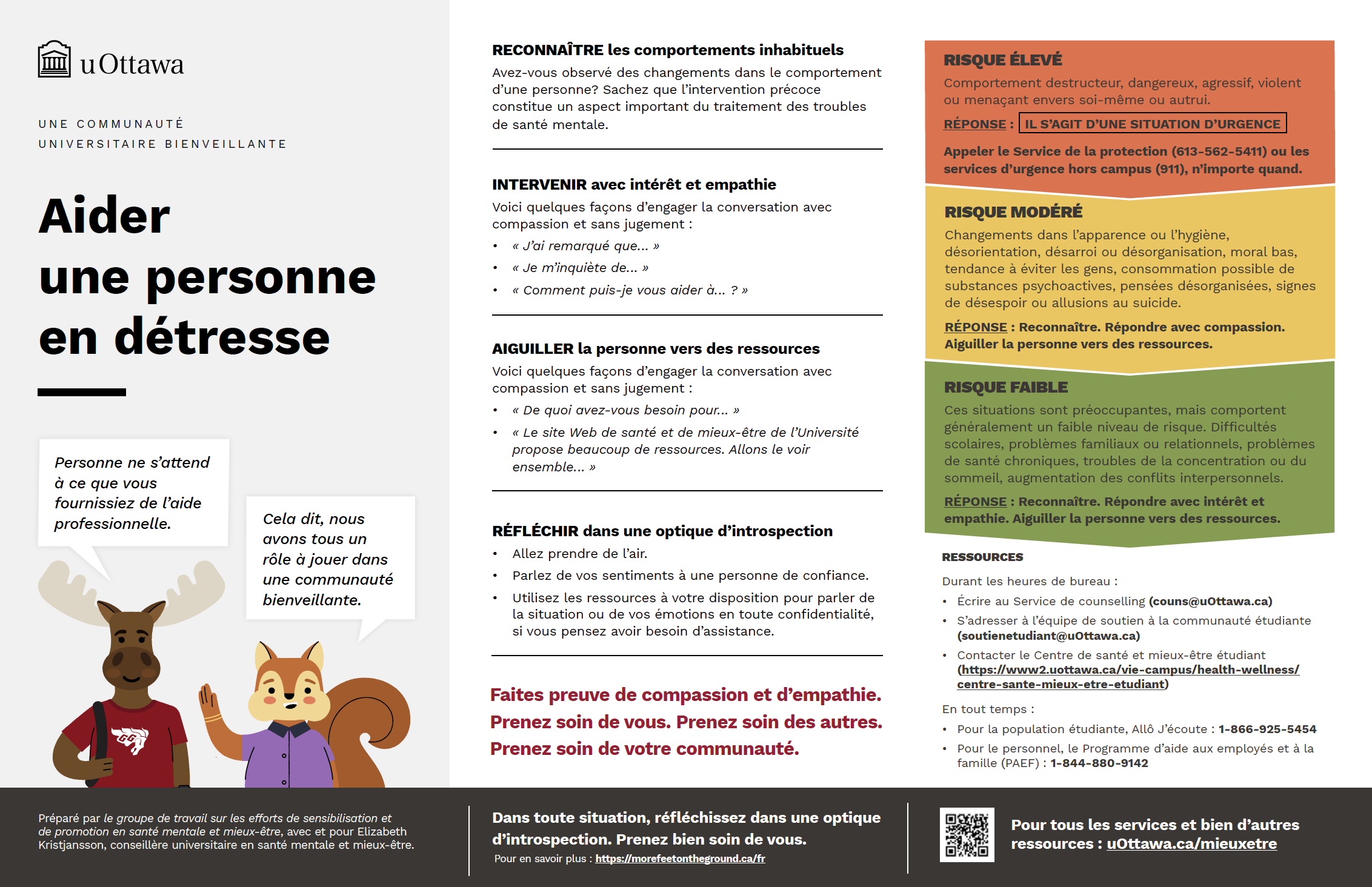2 First days: administrative matters and logistics
In this section
- The basics: Administrative matters and logistics
- Starting point
- Benefits
- APTPUO et APUO
- Mandatory training
- Meals and transportation
- Accounts (uoAccess, email), access, and technical support
- Library
- Important dates
- Resources (help and information)
- A caring University community

The basics: Administrative matters and logistics
On arriving at the University, you’ll first need to familiarize yourself with your new environment. Your hiring unit (e.g., Department) will provide you with orientation in line with its requirements and needs. This guide is intended to provide you with an overview of our institution. The box below illustrates your starting point.
Starting point
- Locate your employee number and your uOttawa email address (e.g., in your employment letter).
- See the Information Technology website for information about procedures for new employees.
- Check out VirtuO, a portal that contains tools used at the University of Ottawa as well as explanations on their use, including links related to teaching (e.g., Faculty Centre, Service Request Console), human resources, Workday (e.g., finance), and internal research and innovation resources.
![]() Contact your faculty if you haven’t received the above information.
Contact your faculty if you haven’t received the above information.
Benefits
All benefits-related information is available in the My Info section of the HR website. If your employment status entitles you to insurance coverage from Canada Life, you should be receiving an email explaining how to apply.
APTPUO and APUO
Part-time professors are represented by the Association of Part-Time Professors of the University of Ottawa (APTPUO). As noted on the APTPUO webpage, the association negotiates working conditions, including the improvement of classroom teaching conditions, on its members’ behalf. APTPUO representatives and their social partners on campus see to the well-being of the University community. The association serves its members and the University community in both official languages.
Full-time professors and librarians, language instructors and continuing special appointment professors are represented by the Association of Professors of the University of Ottawa (APUO). The APUO’s main objective is to promote the interests and well-being of its members and the quality of postsecondary education through collective bargaining and other appropriate means.
Compulsory training sessions
All new University staff need to attend a series of compulsory training sessions.
Meals and transportation
- Food services on campus
- Transportation and parking (parking for cars, bikes, e-vehicles, etc.)
Orientation sessions
Every year, the Teaching and Learning Support Service holds orientation sessions on such topics as teaching, IT and the Library.
Accounts (uoAccess, email), access and technical support
Accounts and passwords
All correspondence from your faculty will be sent to your uOttawa email address.
To create or reset passwords, see our Information Technology service account information.
You’ll also have to set up multi-factor authentication (MFA).
Access to your classroom
You can pick up an access card at our service counter in Morisset Hall (MRT), Room 06. You must be teaching this term to receive your card. You must also provide the following information:
- Employee number
- Telephone number
- Course code for each course taught
- Classroom where each course is taught
After you’ve provided the above information, we’ll create an account for you and issue you an access card. You’ll receive an email notifying you when your card is ready. You can pick it up at MRT 06.
We ask professors to leave their classroom at the appointed time (10 minutes before the hour or half-hour) so that students can get to their next class and the person teaching the next class has enough time to prepare and begin their class on time.
Keys
If you need keys to your office, the lab or shared spaces, contact the person in charge in your department.
Wireless (Wi-Fi) network
The uOttawa wireless network is available across campus 24 hours a day, seven days a week. You can also access resources remotely via the virtual private network.
Online support services
For assistance configuring your computer equipment and for access to the wireless network, contact the IT team at ext. 6555, or fill out a service request form.
Software
There are several software applications you can download for free or at reduced cost, such as Acrobat Pro, OneDrive, Microsoft Office and anti-virus software (also software for home use).
Telephone services
For telephone services, contact IT.
Library
You will need to show your employee card to borrow items from University Library service points. You will need your uoAccess account to access online Library resources.
Important dates
There are important dates and deadlines every academic year. See the important dates and deadlines per term. Be sure to check the dates that apply to your faculty or unit.
Resources (help and information)
Assistance is available from a number of services for professors across campus. Some examples:
- The Teaching and Learning Support Service (TLSS) supports professors in every aspect of teaching. It offers a range of services: teaching technologies, learning spaces, teaching support and high-quality training.
- The Library is more than a place for borrowing and consulting materials. You’ll also find technology- and computer-related resources, as well as research, publication and teaching support services.
- Library services for professors
- Copyright resources for instructors
- The Office of the Vice-President, Research and Innovation (OVPRI) oversees support services for researchers.
- Each faculty has its own undergraduate studies office (USO) and graduate studies office (GSO), which manage student records and assist students. Find out more about academic support that the faculties can provide to your students.
- Official Languages and Bilingualism Institute (OLBI) offers non-credit courses for international students and University of Ottawa staff, as well as a wide range of undergraduate and graduate programs.
A caring University community
Recognizing and helping persons in distress
The A Caring University guide and the Helping a Person in Distress poster (below) are specially designed to help our professors recognize persons in distress, react properly and refer them to the appropriate University and community resources. These tools are intended primarily for students. However, they can also prove useful for other members of the University community.
Taking care of yourself
Here are some recommendations for yourself:
- Set limits and be kind to yourself. As human beings, we have to allow ourselves to make mistakes and learn from them. You don’t have to be available around the clock. (Culture of caring, 2020)
- Get to know your colleagues (Culture of caring, 2020).
- Take part in activities in your department.
- Join discussion groups.
- Join a writing group.
- Use the Academic Leadership services
- Join a mentoring group
- Attend workshops and use services
Mental health and wellness support services for students
The Student Health and Wellness Centre recently opened at the Minto Sports Complex. The centre is staffed by a multidisciplinary team of health professionals that includes physicians, nurses, health promotion specialists, psychotherapists, and psychologists and psychiatrists working together in a shared care model.
Mental health and wellness support services for professors
- The Health and Wellness website brings together information and helpful resources available on campus and in the community.
- LifeWorks, the University’s employee and family assistance program, is available around the clock by phone at 1-844-880-9142 or via LifeWorks online services.
- Need to talk? Here are some resources for you:
- Distress Centre of Ottawa and Region, 24/7 (bilingual): 613-238-3311
- Emergency InfoLine, 24/7 (bilingual): 1-866-996-0991
Poster: Helping a Person in Distress

